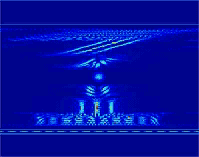The Adaptive Optimal Kernel(AOK)
|
|
|

|
|
|
For more information, please visit their site.
Platforms Supported:
Macintosh, Power Macintosh and Pentium based PCs.
Primary Uses:
Analysis of time-varying acoustic signals in high noise environments. Can be used to analyze large data sets(70000+ data points) using common Desktop Personal Computers. Results are easily imported into MATLABTM or similar analysis program.
Software Available:
The Macintosh PPC or Pentium versions are highly recommended
due to the computational requirements
of the AOK TFR. Macintosh 68K versions are for those without a PowerMac
and lots of time.
- AOK 4.1 for Macintosh PPC
- AOK 4.1 for Macintosh 68K - FPU or No FPU
- TFRView for Macintosh - A Simple Plotting Program For Those Without MATLABTM
- AOK 4.1 for Pentium Based PCs
Source Code:
- AOK 4.1 Source Code
Typical Performance:
| Platform | Processor | Calculation Time |
| MacBook Air | 1.7 GHz Intel Core i7 | 0.046 seconds |
| iMac G5 | 2.1 Ghz PPC 970 | 0.29 seconds |
| 12" PowerBook G4 | 1.33 Ghz PPC 7447 | 0.53 seconds |
| PowerBook G4 | 1 Ghz PPC 7450 | 0.72 seconds |
| Compaq nc6000 Laptop | 1.6 Ghz Pentium-M | 0.70 seconds |
| PowerMac G3 | 375 Mhz PPC 750 | 2.65 seconds |
| Gateway PC | 200 Mhz 586 | 6.59 seconds |
| SUN UltraSPARC2 | 64-bit UltraSPARC | 12.80 seconds |
| PowerMac 7100 | 80 Mhz PPC 601 | 16.01 seconds |
| SUN SPARC20 | SPARC | 30.27 seconds |
| Mac IIsi | 20 Mhz 68030 w/ fpu | 50.31 minutes |
| Mac IIsi | 20 Mhz 68030 no fpu | 187.01 minutes |
I tried to make an "All-In-One" TFR calculator based on the above code. If you're a programmer and want to see how the Wigner and Choi-Williams TFRs compare to the Adaptive TFR, please click here. The zip archive includes source code, a Mac version and a PC version. Follow the instructions provided with the AOK code above. More generic source code for other Windows compilers can be downloaded here.